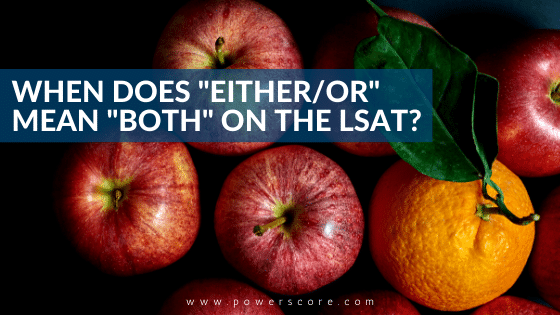Understanding the proper conditional relationship represented by the “either/or” conjunction in LSAT questions is crucial in both Logic Games and Logical Reasoning questions. While there are some solid rules you must follow, ultimately you should take into account the context in which the phrase is used.
Learning the Rules
Typically, a rule such as “either A or B must be selected” is inclusive. It allows for the possibility of selecting both A and B (unless the rule specifically precludes that by stating “either A or B must be selected, but not both”). Thus, at least one of A or B must be selected:
However, compare this rule to the following:
- Mary has a higher LSAT score than does either Kate or Jane.
Whenever this wording is used (“than does either” or “than either”), we can infer that Mary’s LSAT score is higher than either of the other two girls’: i.e. Mary has a higher score than both of them. In this case, “either” requires the use of the conjunction “or” to make the sentence is grammatically correct.
Sample Problems
Let’s take a few examples.
In the statements below, “either…or” means “both”:
- Anne arrives earlier than does either Bob or Cathy.
- Jack is a better chess player than is either his mentor, or his opponent.
By contrast, in the following statements “either/or” does not necessarily mean “both,” and just means “at least one”:
- Anne arrives before Bob or before Cathy.
- Jack is either a better chess player than his mentor, or a better chess player than his opponent.
Finally, in the statements below, “either/or” precludes the possibility of “both”:
- Anne arrives before either Bob or Cathy, but not before both.
- Jack is either a better chess player than his mentor, or a better chess player than his opponent, but Jack is not a better player than both his mentor and his opponent.
The point of this discussion is that you must be very careful when you see the “either/or” construction, and you cannot assume that it always means “at least one, possibly both.” As we have seen, there are certain circumstances when it means just “both,” and there are times when the test makers throw in additional language to eliminate the possibility of “both.” Always read very closely, and you will be rewarded when the test makers go beyond the normal usage!



Liana says
thanks for info.
Ryan says
Can you help me understanding when either / or is used in a boolean statement? Such as:
Either A or B can be used to accomplish task C.
Is the statement true or false, when there is knowledge that A cannot accomplish task C?
Dave Killoran says
Hi Ryan,
Thanks for the message. A situation such as the one you describe would only occur on the LSAT after knowing the either/or statement was possible, for example as part of the rules of a logic game. Later information, such that A cannot accomplish task C could be added, but that would only limit posibbilities; it would not make the initial either/or statement false.
Thanks!
Sarah says
If the word only either is used?
For eg there was a question saying
O is greater than either of K and atleast greater than one of L.
In this “or” isn’t used.
Hence in this question will either be used as k1 or k2 or both k1&k2?
Jon Denning says
Hi Sarah – thanks for posting!
I’m not sure I fully understand what you’re asking here. Any chance you could point me in the direction of the question/example you’re referencing so I can read it directly (as originally written)? That might help clear things up on my end, and give me a better chance of helping you out 🙂
Thanks!
Emily says
Where is the section on “either/or, not both” in the 2018 Bible? I’ve looked all over and can’t find it.
Dave Killoran says
Hi Emily,
The discussion of Either/Or begins on page 208 of the 2018 LRB edition 🙂 There’s then a summary on page 232.
Thanks!